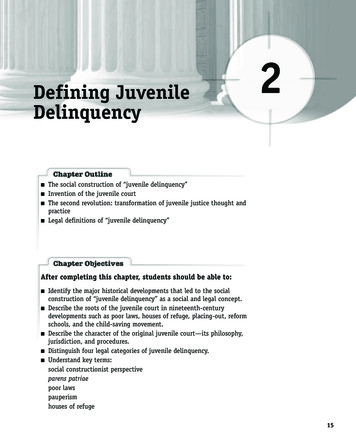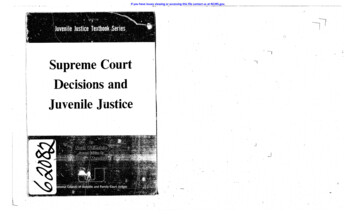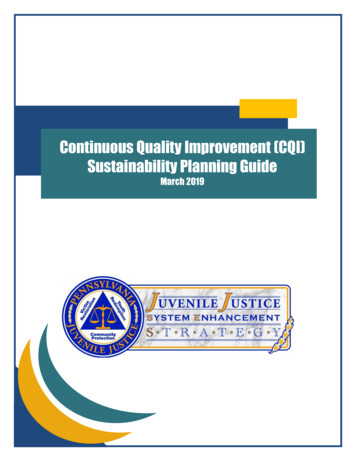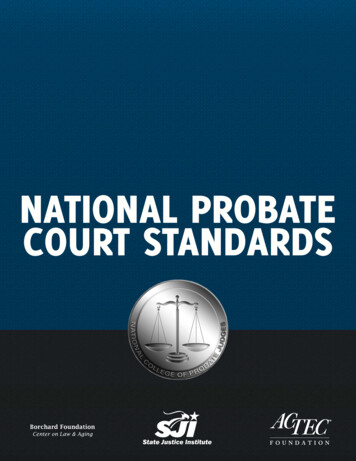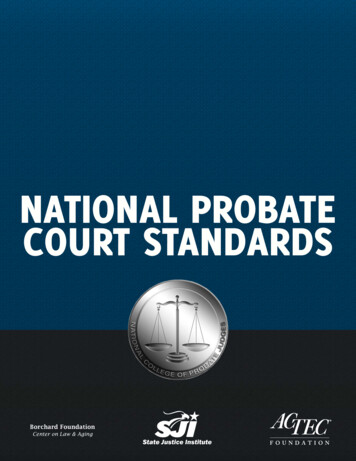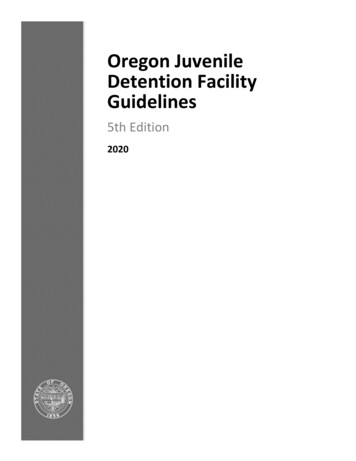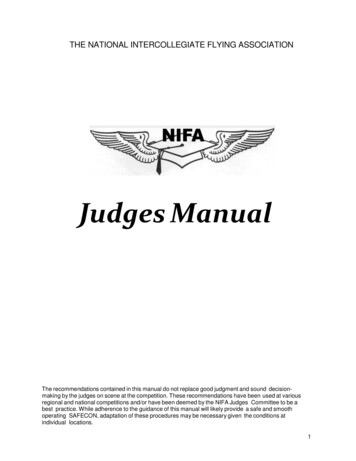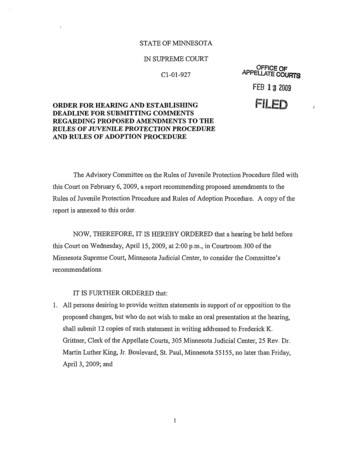
Transcription
JPENNSYLVANIAthe newsletter of thePennsylvaniaJuvenile CourtJudges’CommissionVolume 16, Number 1Act 76AmendsJuvenileActUVENILEUSTICECommonwealth of Pennsylvania, Edward G. Rendell, Governorwww.jcjc.state.pa.usJanuary 2008Governor Rendell signed SB 1156 (1576)into law as Act 76 of 2007 on December 18,2007.Act 76, which became effective on January 1, 2008,amends the Juvenile Act at 42 Pa. C.S. §6336.1,(relating to notice and hearing), to provide that achild’s foster parent, preadoptive parent or relative providing care for the child now has the “right,”rather than opportunity, to be heard at any hearingunder the Juvenile Act. It also amended §6351 (e)(1) (relating to permanency hearings), to provide thatin any permanency hearing held with respect to thechild, the court must consult with the child regardingthe child’s permanency plan in a manner appropriate to the child’s age and maturity. If the court doesnot consult personally with the child, the court isrequired to ensure that the views of the child regarding the permanency plan have been ascertained to thefullest extent possible and communicated to the courtby the guardian ad litem or, as appropriate to thecircumstances of the case, by the child’s counsel, thecourt-appointed special advocate or other person asdesignated by the court.The amendments to §6351 (e)(1) contained in Act 76also apply to the “permanency hearing” phase of adisposition review hearing in a delinquency case, toensure federal funding to offset the cost of the child’splacement under Title IV-E of the Social Security Act.To sign up for the Governor’s newsletter, click here www.governor.state.pa.us
Chiefs Celebrate 40 Years of ServiceBy Andy DeAngeloOn November 29th, 2007 the PennsylvaniaCouncil of Chief Juvenile Probation Officerscelebrated 40 years of service at the NittanyLion Inn, State College, Pennsylvania. Several hundred active and retired professionals in the juvenilejustice system attended this event. Governor Ed Rendell cited the Council, in a Proclamation, as a modelfor the nation for its commitment to excellent serviceto young people and crime victims. The Council wasinitially formed for the promotion and developmentof juvenile probation services in Pennsylvania. Theobjectives of this organization include the reviewand development of best practice standards, including: juvenile probation staff training; juvenile probation officer caseload size; outcomes for delinquentchildren; and research projects. The first organizational meeting was held November 14, 1967, in StateCollege, by acting chairman, Mercer County ChiefJuvenile Probation Officer Willis Brinker.and detention standards, the graduate program atShippensburg University and the implementationand training for juvenile probation staff throughout the Commonwealth. In 1995, during a specialsession of the legislature, twelve laws were enactedamending the Juvenile Act including the principlesof Balanced and Restorative Justice. These principles ensure accountability, community protectionand competency development within Pennsylvania’s juvenile justice system. Council members andJCJC staff provided the impetus for the inclusionof these principles, as well as the emphasis forvictim involvement in the juvenile court process.The Council has also supported the efforts to define and report system outcomes on both local andstate levels to the public.The event was planned by Berks County Chief Juvenile Probation Officer Robert N. Williams, and othermembers of the Council. Bruce A. Grim, retiredBerks County Chief Juvenile Probation Officer anda past president of the Council, presided as Masterof Ceremonies for this event. Guest speakers for thisoccasion included: Judge Arthur E. Grim, Chairmanof the Pennsylvania Juvenile Court Judges’ Commission (JCJC); James E. Anderson, Executive Directorof the JCJC; Steven B. Custer, Montgomery CountyChief Juvenile Probation Officer and President of theCouncil; as well as several past presidents. Duringhis remarks, retired Chief Brinker noted that therewere limited resources in the 1960’s for juvenileprobation officers. Through the efforts of the Council, improved services for juvenile offenders were adirect result. From inception, the Council has been,and continues to be, an active and vocal organization.The Council has a strong relationship with thejudges and staff of the Pennsylvania Juvenile CourtJudges’ Commission. The partnership with JCJChas been an important factor in many of the majorevents that have transpired during the Council’s 40year history. In 1972, the Council and JCJC jointlyinfluenced the amendments to the PennsylvaniaJuvenile Act and the development of appropriateresidential programs for delinquent youth. Theseorganizations also worked together on juvenile court2This publication is produced monthly at the Center for Juvenile Justice Training and Research at Shippensburg University.Guest articles are always welcome; please submit them byemail or on a disk. We particularly enjoy your photographs.John Cookus is the editor. Our address is CJJT&R, Shippensburg University, 1871 Old Main Drive, Shippensburg, PA17257-2299. (jcookus@state.pa.us)
Pennsylvania Council of Chief Juvenile Probation Officers40th Anniversary CelebrationFirst Row (L to R): John E. Johnson, Chief, Luzerne County, Larr Mason, Former Chief, Westmoreland County,Edward R. Robbins, Chief, Lycoming County, William J. Rossnock, Chief, Northumberland County, RichardSteele, Former Chief, Northumberland County, Steven Custer, Chief, Montgomery County, Lawrence J. DeMooy,Chief, Delaware County, Robert Williams, Chief, Berks County, Samuel E. Miller, Jr., Chief, Cumberland County.Second Row (L to R): Clay Yeager, Former Chief, Columbia County, Nancy B. Williams, Chief, Blair County, Diane Miller, Former Chief, Warren County, Susan L. Blackburn, Former Chief, Somerset County, Adeline Beighley,Chief, Westmoreland County, Marietta Lamb-Mawby, Chief, Chester County, Andrew Kistler, Former Chief, Crawford County, Will Brinker, Former Chief, Mercer County, Edward Shearn, Chief, Schuylkill County, Bruce Grimm,Former Chief, Berks County, Paul J. Werrell, Chief, Lehigh County, Thomas Antolik, Former Chief, Erie County.Back Row (L to R): John R. Penderville, Chief, Washington County, Kenton Scott, Former Chief, Jefferson County, Marshall R. Davis, Chief, Wyoming County, Kelly Franklin, Former Chief, Sullivan County, William J. Pysher,Former Chief, Northampton County, James Sharp, Chief, Philadelphia County, Cynthia A. Wess, Chief, CambriaCounty, Michael Noyes, Former Chief, Butler County, David L. Stager, Chief, Tioga County, Thomas P. Green,Former Chief, Schuylkill County, Robert J. Blakely, Chief, Erie County, Michael A. Schneider, Chief, NorthamptonCounty, Daniel Rhoades, Former Chief, York County, David H. Mueller, Chief, Lancaster County, Michael Brestin, Former Chief, Northumberland County, Michael McCalpin, Former Chief, Blair County, William Ford, FormerChief, Bucks County, Stephen J. Suknaic, Chief, Dauphin County, John Betters, Former Chief, Somerset County,Robert Daugherty, Chief, Venango County, James E. Anderson, Former Chief, Elk County, James Rieland, Chief,Allegheny County, Robert J. Stanzione, Chief, Bucks County3
Juvenile Court ConsultantVacanciesThe Commonwealth of Pennsylvania is seeking candidates to fill two full-time JuvenileCourt Consultant positions in the JuvenileCourt Judges’ Commission, Harrisburg, PA. Oneposition will serve as the primary point of contactfor juvenile court judges and chief juvenile probation officers regarding Specialized ProbationServices Programs and provide on-site monitoringand evaluations of Specialized Probation ServicesPrograms to ensure compliance with relevant program standards. The second position will serve asthe Director of the Graduate Education Programat the Center for Juvenile Justice Training andResearch at Shippensburg University. Both positions will provide on-going technical assistance tojuvenile court judges and chief juvenile probationofficers regarding the implementation of balancedand restorative justice principles.The minimum experience and training requirements for the positions are: Five years of experience as a juvenile probation officer and a master’sdegree in criminal justice, criminology, or thebehavioral sciences.The Commonwealth of Pennsylvania offers a comprehensive benefit package. The starting annualsalary for the positions is 45,438. Appointmentsabove the starting rate may be considered andwill be commensurate with the candidates’ education, work experience, and salary history. Theseare Civil Service positions that require Pennsylvania residency. An eligible list will be establishedthrough the evaluation of job-related experienceand training of qualified applicants by the CivilService Commission, based on the submission ofwritten application materials provided by the candidate on the civil service application and application supplement. You may complete your application and Application Supplement No. 2008-094-1online at the State Civil Service website or youmay submit your completed paper application andpaper application supplement to: State Civil Service Commission (ATTN: Applications) P.O. Box569, Harrisburg, PA 17108-0569, postmarked byno later than February 15, 2008. Please contactKeith Snyder at (717) 787-5634, for additionalinformation.The Commonwealth of Pennsylvania is proud tobe an Equal Opportunity Employer supportingworkforce diversity.4PAPPC to Host 87th AnnualTraining InstituteThe Pennsylvania Association on Probation,Parole and Corrections will host it’s 87th Annual Training Institute at the Inn at PoconoManor, May 18 – 21, 2008. This year’s theme is:Working Together, Working Smarter For SaferCommunities. The institute promises to be an experience in professional development and networking featuring local, state and national leaders andtrainers within the fields of probation, corrections,treatment and victim services.The opening plenary session will feature a Panel ofexperts from Pennsylvania, moderated by WilliamD. Burrell. William “Bill” Burrell served for nineteen years as Chief of Adult Probation Services inthe New Jersey State Court System. Most recentlyhe served on the faculty of Temple University andis currently a private consultant and chairmanof the Editorial Committee for Perspectives, thejournal of the American Probation and Parole Association (APPA) Board of Directors. He is also amember of the editorial board of Community Corrections Report.Panel members who have confirmed their participation at this time are: Catherine C. McVey, Chair of the Pennsylvania Board of Probation and ParoleJeffrey A. Beard, Secretary of Corrections,PA Department of CorrectionsJames E. Anderson, Executive Director ofthe Juvenile Court Judges’ CommissionCarol Lavery, Victim Advocate of PennsylvaniaConway Bushey, Executive Director of theCounty Chief Adult Probation and ParoleOfficers Association of PAWednesday’s inspirational speaker will be DominicHerbst, M.S., M.A. Dominic is a therapist, author,consultant, public speaker, certified psychologistand a nationally renowned figure in the fieldsof juvenile justice and family therapy. Detailedregistration information is available on the PAPPCwebsite.
Facts of Life Seminar Enhances Competence in MoralReasoningBy Douglas R. Ramm, Ph.D., Board Certified Clinical PsychologistThe Facts of Life Seminar is a character development program which motivates adolescents to dowhat is right by demonstrating how it is in their own best interest to act on principle in daily living. It is based on the premise that while there are several factors which contribute to antisocialbehavior, the desire to make a positive choice is the most effective deterrent to delinquent behavior. SinceJudge John Driscoll decided to make this program a mandated intervention for all youth adjudicateddelinquent in Westmoreland County in 2003, hundreds of teens have successfully participated. Outcomestatistics indicate that of those who have completed the program there has been a 123% increase in thenumber who are likely to refrain from violence, a 92% increase in those likely to refrain from theft, a178% increase in those who are likely to keep promises and a 160% increase in those who are likely totell the truth.The Facts of Life Seminar is an educational group process learning format which can be lead by juvenileprobation officers, mental health professionals, caseworkers and teachers in day treatment programs andresidential placements. It consists of a series of lessons based on cutting edge research which has identified the relationship between happiness and human behavior which indicates that people are motivatedto do what is right when they believe right behavior will enhance their potential to become happy, contentand satisfied with life. Participants in the program are provided with a research-based model of understanding the nature of a good life and what people need to do to become and remain happy.Once participants have a good grasp of what they need to have a satisfying quality of life, they are introduced to a set of seven self-defeating behaviors. These are courses of action which research indicates arelikely to have a negative impact on a person’s quality of life. In addition to showing participants how theylose what they need to become and remain happy by lying, cheating, stealing or assault, the seminar alsodemonstrates how they jeopardize their contentment and satisfaction with life when they abuse drugs andalcohol, engage in irresponsible sexual activity or fail to invest sufficient time and energy in an effort toobtain an education.Once the participants have the ability to identify self-defeating behavior, they are introduced to alternatives to these potential courses of action. These alternatives are what psychological researchers havereferred to as a set of scientifically formulated principles of morality. Participants are taught how to engage in principled reasoning. They are motivated to act on scientifically formulated principles of moralitybecause they can see how doing so enhances their personal quality of life.This model for principled reasoning appeals to adolescents because it does not require that they buy intoany religion or philosophy. The Facts of Life Seminar is ideally suited for Pennsylvania’s approach to balanced and restorative justice because it provides a means of enhancing moral reasoning skills which isnot affiliated with any religious order or political school of thought. You can learn more about The Factsof Life Seminar at their website.The JCJC’s Center for Juvenile Justice Training and Research sponsored the first statewide trainingprogram for those interested in learning how to lead Facts of Life Seminars in 2006. The next trainingprogram is scheduled at State College on April 2-3, 2008. Details on the workshop and the opportunityto register may be reviewed within the Spring 2008 training section of the JCJC website.5
Youth and Family Teams as Evidence-Based PracticeBy Stan Mrozowski, Ph.D.Across the nation, there is growing recognition of the need to use evidence-based practices to address the challenges of childrenand youth with serious behavioral health problems. Services such as MultiSystemic Therapy,Functional Family Therapy and MultiDimensionalTreatment Foster Care (described elsewhere in thisedition) have an impressive research base.While these interventions come with strong empirical support, there is emerging evidence that Youthand Family Teams, with their emphasis on family engagement, can further improve outcomes ofevidence-based practices (Bruns, 2004). Youth andFamily Teams engender commitment to evidencebased practices by engaging youth and families inchoosing the most effective treatment.In Pennsylvania, we are embarking on a majortransformation of the children’s behavioral healthsystem. We will be changing the practice model toestablish Youth and Family Teams as the center ofservice planning and delivery. We are creating aninstitute to train, coach, and monitor the facilitation of Youth and Family Teams. Training will bebased on the standards recently established bythe National Wraparound Initiative (Bruns, et al.,2004). In addition, in light of strong evidence thatadherence to the principles and protocols of thewraparound process predict future child and family service and functioning outcomes (Bruns, Suter,Force, Burchard, & Dakan, 2003), a fidelity monitoring tool will be used to monitor and supportquality. We believe this will insure adherence to thebest practice for youth and their families.References:Bruns, Eric J. (2004) The evidence base and wraparound. Presented at the 11th Annual Building onFamily Strengths Conference, Portland, Oregon,May 7, 2004.Bruns, E. J., Suter, J., Burchard, J. D., Force, M.,& Dakan, E. (2003). Fidelity to the WraparoundProcess and its Association with Outcomes. In C.Newman, C. Liberton, K. Kutash, & R.M. Friedman(Eds.), The 15th Annual Research ConferenceProceedings: A System of Care for Children’sMental Health. Tampa: University of South Florida,Florida Mental Health Institute Research andtraining Center for Children’s Mental Health.6Stan Mrozowski is the director of the Bureau ofChildren’s Behavioral Health Services, Office ofMental Health and Substance Abuse Services,Harrisburg, Pa. Reprinted by permission fromthe December 2007 edition of the PA CASSPNewsletter.Call for Presentations:National Symposium onJuvenile ServicesThe National Partnership for JuvenileServices has issued a “Call forPresentations” for the upcoming 14thNational Symposium on Juvenile Services tobe held on October 5 - 8, 2008 at the SheratonStation Square Hotel in Pittsburgh, Pennsylvania.A limited number of workshop slots are available for individuals and groups interested inconducting presentations at this conference.To submit a proposal for consideration, visittheir website and email, fax (859-622-2333) ormail your proposal to the National Partnershipfor Juvenile Services, ATTN: SYMPOSIUMPROPOSAL, EKU-300 Perkins Building/521Lancaster Avenue, Richmond, KY 40475-3102.Please email submissions in Microsoft Wordformat. All proposals for consideration must bereceived no later than February 28, 2008.
Survivor Speakers’ Bureau InformationThe Survivor Speakers’ Bureau (SSB) consists of a group of survivors who can craft and delivertheir personal messages of survival to diverse audiences with the goal of educating on crime, survival, crimes’ impact on communities and to give hope to other survivors.The speakers in the SSB can adapt their messages to meet the needs of the requestors for all speakingengagements and audiences. Speakers are prepared to speak independently and on impact panels withother survivors of crime. They respect time constraints and can effectively answer questions from theaudience and media.The members of the SSB are eager to speak at events across the state; to raise awareness in communities,educate individuals, inspire empathy in offenders and empower victims onto the path of survival.“My reason for public speaking is to let people know they are not alone and to educate them on thesematters. If I can make a difference with even just one person then that is what really matters.” - Angela,Speaker with the SSB“Each time I speak to other survivors, I get a little stronger. Each time I tell Toni’s (my sister’s) story, Iget a little stronger. Each time I speak out against domestic and gun violence I find my strength.” - Shelly,Speaker with the SSB.“Mark’s life is not lost in vain if we are able to learn from his and other tragedies. He may be gone but bydoing this, he is never forgotten.” - Shawn, Speaker with the SSB.Victims Rights’ week will be here before you know it. The SSB has 21 passionate and trained publicspeakers. If you are planning a vigil, Take Back the Night, impact panel, rally, need to fulfill a mediarequest, want to add a survivor’s voice to an in-service training or conference or any other event, pleasecontact Krista Hoffman at 717-265-8726 to schedule a speaker.7
Call for PresentationsThe Pennsylvania Conference on Juvenile JusticeNovember 5 - November 7, 2008Harrisburg Hilton and TowersThe sponsors of The Pennsylvania Conference on Juvenile Justice are requesting presentations forworkshops to be offered on Thursday, November 6, 2008. Interested presenters should complete thisform and return it by May 19, 2008. In order for your application to be considered, please submit aprogram description, a brief biography of the trainer and any supplementary materials. Proposed title of workshop: Brief description of presentation: (50 words or less) Brief biography of the trainer(s): (50 words or less) Please list a reference and contact information of someone who is familiar withthe trainer/presentation:Name:Agency:Telephone: This presentation is best suited as a: 90-minute workshop (presented in one 90-minute session) 180-minute training (presented in two consecutive sessions)
Please Note: Two presenters from each selected workshop will be our guests during the course ofthe three-day conference with all registration fees waived. Presenters will be responsible for their ownlodging and travel expenses. This workshop is recommended for: (check all that apply) Juvenile Court Judges Juvenile Court Masters Residential Program Providers Community Prevention Specialists Specialized Probation Officers Chief Juvenile Probation Officers Juvenile Probation Supervisors Victim Services Representatives Local and State Policy Officials Other (please specify)Name of principal contact person/trainer:Agency/organization and address:Telephone:Fax:Email address:PLEASE RETURN THIS APPLICATION AND ATTACH ALLSUPPLEMENTARY PROGRAM DESCRIPTIVE MATERIALS,TRAINER’S VITA, AND PARTICIPANT HANDOUTS BYMONDAY, MAY 19, 2008 TO:John Cookus, DirectorCenter for Juvenile Justice Training and ResearchShippensburg University1871 Old Main DriveShippensburg, PA 17257Phone: 717-477-1188Fax: 717-477-1236E-mail: jcookus@state.pa.us
By Andy DeAngelo and detention standards, the graduate program at Shippensburg University and the implementation and training for juvenile probation staff through-out the Commonwealth. In 1995, during a special session of the legislature, twelve laws were enacted amending the Juvenile Act including the principles of Balanced and Restorative .
